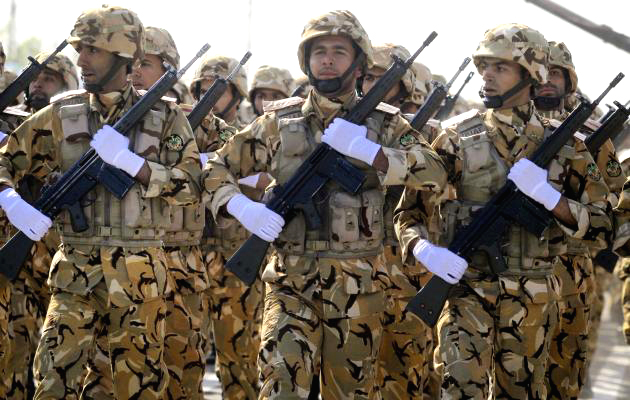
IRAN’S Foreign Minister Mohammad Javad Zarif has warned US President Donald Trump to avoid threatening the Iranians, advising him to ‘try respect’ as the only approach to the Iranian nation, which may bear fruit.
‘NeverThreatenAnIranian. Try respect – it works!’ Zarif said in a post on his official Twitter account on Monday amid a spike in tensions between Tehran and Washington.
The Iranian foreign minister added that the policy of ‘economic terrorism and genocidal taunts’ pursued by Trump would fail to ‘end Iran.’
‘Iranians have stood tall for millennia while aggressors have all gone,’ he noted.
The top Iranian diplomat emphasised that Trump has been ‘goaded’ by the ‘B-Team’ in pushing the Middle East region towards chaos, and ‘hopes to achieve what Alexander, Genghis and other aggressors failed to do.’
The hawkish ‘B-team’ is comprised of US National Security Adviser John Bolton, Israeli Prime Minister Benjamin Netanyahu, Saudi Crown Prince Mohammed bin Salman and Abu Dhabi Crown Prince Mohammed bin Zayed Al Nahyan.
Zarif’s comments followed an earlier tweet by the US president who said the Islamic Republic would be destroyed if it attacked US interests.
‘If Iran wants to fight, that will be the official end of Iran. Never threaten the United States again,’ Trump tweeted.
Trump posted his anti-Iran tweet after a Sunday night rocket attack on the Green Zone of the Iraqi capital Baghdad, where the Iraqi government’s administrative buildings and foreign missions, including the US embassy, are located.
No one has claimed responsibility for the attack, which came in the wake of back-to-back sudden decisions taken by the US recently, including its withdrawal of ‘non-essential’ staff from Iraq.
Although the apparent Katyusha attack hurt no one and its target was not specified, Trump was quick to point the finger at Iran.
The Green Zone, a 10-square-kilometre area in central Baghdad, is home to Iraqi government offices and those of other foreign governments, including the US.
Tensions started to mount between Tehran and Washington last May, when Trump pulled his country out of the 2015 nuclear deal with Iran, officially known as the Joint Comprehensive Plan of Action (JCPOA), and re-imposed harsh sanctions against the Islamic Republic in defiance of global criticisms.
The tensions saw a sharp rise on the first anniversary of Washington’s exit from the deal as the US moved to ratchet up the pressure on Iran by tightening its oil sanctions and sending military reinforcements, including an aircraft carrier strike group, a squadron of B-52 bombers, and a battery of patriot missiles to the Middle East.
On May 5th, Bolton – an ardent anti-Iran hawk – said the deployment was in response to ‘troubling and escalatory indications’ of Iranian activity in the region, without giving details or evidence to support the claims.
Meanwhile, a senior Iraqi Shia cleric has warned about the negative consequences of tension between Tehran and Washington for the region, saying that Iraq can play a positive role in controlling the situation.
Ammar al-Hakim, the Leader of the National Wisdom Movement, made the remarks in a Sunday meeting with Joey Hood, the Chargé d’Affaires of the US Mission in Iraq, amid the heightened tension between Tehran and Washington.
- A senior Iranian academic has criticised the attitude of the United States government toward young Iranians, particularly university students and researchers, saying the US will not be able to weaken the ‘iron will’ of the youths through such measures as the recent arrest of an Iranian stem cell researcher.
‘Iran’s researchers and intelligent youth have found their way. They know what to do and how to solve their country’s problems, how to develop their universities and how to realise their revolutionary goals,’ Vice-Chancellor of Tehran’s Tarbiat Modares University, Yaqoub Fat’hollahi, said on Sunday.
Media reports said on Saturday that Masoud Soleimani, a top Iranian stem cell scientist, has been imprisoned in the United States without trial for the past eight months.
In October 2018, Soleimani, a professor and biomedical researcher at the Tarbiat Modares University (TMU) in Tehran, was arrested by the US Federal Bureau of Investigation (FBI) upon arrival in the US.
Fat’hollahi warned about the damage such behaviour would do to the image of the people and government of the US.
Leonard Franco, the detained scientist’s attorney in Atlanta, says his client has been held in jail there without bail.
Soleimani had been invited by the Mayo Clinic in Minnesota to lead a research programme there, but he was secretly indicted by the FBI, which also cancelled his research visa. Neither the FBI nor the US prosecutors have so far officially commented on his detention.
Elsewhere in his interview, Fat’hollahi said those Iranians who, like the jailed scientist, are working for the independence of their country are subject to such treatment by the US government ‘at any time’ and ‘it would be wise for them to be cautious in the face of such behaviour.’
Washington, he said, has been intolerant of Iran’s progress toward scientific independence since the victory of the Islamic Revolution in 1979.
Fat’hollahi called on the FBI to come clean about the circumstances under which the Iranian scientist was arrested, saying: ‘I urge the FBI to tell the world’s public opinion why they have arrested him and say what illegal measure he has taken.’
He also urged ‘scientific circles in the United States and other developed countries, including the Europeans, to help put an end to this unjust behaviour and secure the Iranian researcher’s release,’ adding: ‘Such behaviour harms the US people and government more than us.’
Soleimani’s case has been adjourned at least three times since October, and his family and the TMU have so far paid $70,000 to his lawyers to prove his innocence, but all to no avail.
Almost 50 Iranian nationals are currently imprisoned in the US under various pretexts, the most important of which being bypassing the US sanctions.